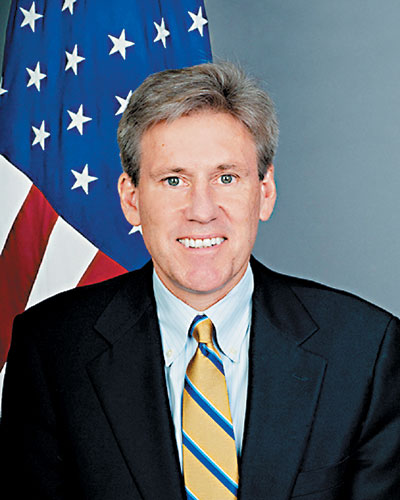
The U.S. ambassador to Libya and three embassy staff were killed after a mob stormed the U.S. consulate in the eastern city of Benghazi late Tuesday. Christopher Stevens, a career U.S. foreign service officer, is one of the most experienced U.S. envoys in the region. HE was America’s version of James Bond — a bold, fearless figure known in Libya as a “legend.” Christopher Stevens was in many ways the model American diplomat, committed, idealistic, willing to take risks and eager to find out what was really happening in obscure corners of the world. A lanky 52-year-old Californian with a burst of brown hair, Stevens also looked the part. “He was always smiling, unruffled, projecting what I think of as a cool California demeanor, in the best sense,” said Robert Danin, a former Middle East hand at the State Department who worked closely with Stevens. A lifelong diplomat, Stevens was the natural choice to act as U.S. liaison when rebels rose up against Moammar Gadhafi in 2011. He couldn’t just fly into the country — so he hitched a ride on a Greek cargo ship and sailed into Benghazi just as the fighting erupted. His team initially set up in a hotel — until a car bomb blew up in the parking lot and drove them out. So Stevens and his team scrambled to set up a makeshift office — and got to work. The charismatic Stevens, able to connect with both high-ranking officials and the ragtag rebels, sent cables back to the United States detailing Gadhafi’s monstrous actions. A few months ago, Stevens sent an e-mail to friends, talking about how Tripoli had changed since the Gadhafi years. “The whole atmosphere has changed for the better,” he wrote. “People smile more and are much more open with foreigners. Americans, French and British are enjoying unusual popularity. Let’s hope it lasts!” It was that winning personality that earned him the trust of revolutionaries. On Tuesday, in an attack on the U.S. Consulate in Benghazi, the lawyer-turned-diplomat became the first American ambassador to die in the line of duty since 1988. Three other Americans were also killed in the assault by heavily armed attackers in violence that followed a street protest outside the American facility in eastern Libya. “It’s especially tragic because Chris Stevens died in Benghazi . . . a city he fought to save,” U.S. President Barack Obama said. A member of Stevens’ Foreign Service training class said Stevens was the “quintessential diplomat,’’ who was “unflappable, but not nerdy.” “I heard about his death when I was on the road, and I just pulled over and cried,” said another friend, Daniel Seidemann, an Israeli lawyer. “We called him ‘the senator.’ He was capable of expressing empathy with Israelis and Palestinians simultaneously in the same room without being one bit maudlin or romantic about it. This was real nobility.” In Libya, friends echoed the sentiment. “Everybody in Benghazi and Tripoli is appalled,” tweeted Omar Amer Al Barghathi, founder of the Libyan Youth Movement. Several Libyans on Wednesday night rallied to protest Stevens’ murder. They held up signs that read, “Chris Stevens was a friend to all Libyans,” and, “Sorry, People of America.” Stevens was born in the San Francisco Bay area. He was the son of a lawyer, Jan Stevens, and a now-retired Marin Symphony cellist, Mary Commanday. He graduated from the University of California at Berkeley in 1982, earned a law degree from the University of California Hastings College of Law in San Francisco, and worked briefly as a trade lawyer in Washington, D.C. He joined the Foreign Service in 1991, serving in Washington, then in postings across the Middle East — Libya, Syria, Israel, Egypt and Saudi Arabia. His passion for the region dated to his service in the 1980s as a Peace Corps volunteer teaching English in a small Moroccan town high in the Atlas Mountains. When he was sworn in as ambassador to Libya earlier in May, Hillary Clinton spoke of his “California cool.” Colleagues said he was levelheaded, and comfortable enough to greet reporters at the Benghazi compound wearing flip-flops. He turned quick background briefings into lengthy and candid back-and-forth discussions. When the Libyan revolution exploded in 2011, Stevens could have stayed in Washington. But the United States needed an expert on the ground who could figure out what was happening during one of the touchiest moments of the Arab Spring. “He knew how dangerous this was. He had been there before,” said Gene Cretz, who at the time was U.S. ambassador to Libya. “He was just so committed to Libya, as soon as he was asked, he was willing to go.” In a video he made to introduce himself to Libyans shortly before he took up his post as ambassador this spring, Stevens spoke of America’s own traumatic civil war, and his optimism about Libya. “I look forward to exploring these possibilities with you as we work together to build a free, democratic, prosperous Libya,” he said. “See you soon.”(SD-Agencies) | 
